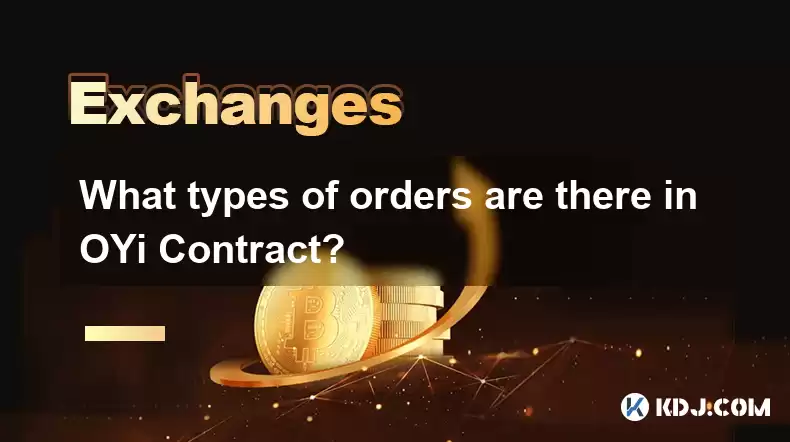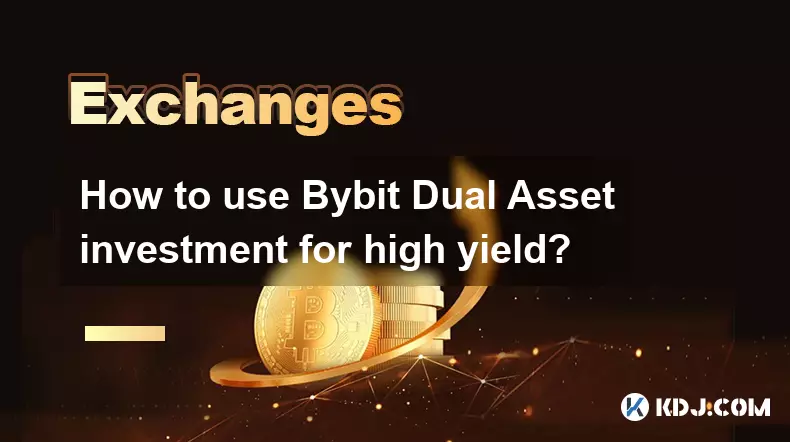-
 bitcoin
bitcoin $87959.907984 USD
1.34% -
 ethereum
ethereum $2920.497338 USD
3.04% -
 tether
tether $0.999775 USD
0.00% -
 xrp
xrp $2.237324 USD
8.12% -
 bnb
bnb $860.243768 USD
0.90% -
 solana
solana $138.089498 USD
5.43% -
 usd-coin
usd-coin $0.999807 USD
0.01% -
 tron
tron $0.272801 USD
-1.53% -
 dogecoin
dogecoin $0.150904 USD
2.96% -
 cardano
cardano $0.421635 USD
1.97% -
 hyperliquid
hyperliquid $32.152445 USD
2.23% -
 bitcoin-cash
bitcoin-cash $533.301069 USD
-1.94% -
 chainlink
chainlink $12.953417 USD
2.68% -
 unus-sed-leo
unus-sed-leo $9.535951 USD
0.73% -
 zcash
zcash $521.483386 USD
-2.87%
What types of orders are there in OYi Contract?
Traders can use limit orders to secure favorable pricing by placing them at specific price levels in anticipation of market conditions.
Jan 29, 2025 at 03:19 pm

- Overview of order types available on OYi Contract
- Detailed explanation of each order type, including limit orders, market orders, stop-limit orders, and conditional orders
- Benefits and use cases of each order type
Order Types Available on OYi Contract
Limit Orders:- A limit order specifies a specific price at which a user wants to execute a trade.
- Limit buy orders can be used to purchase an asset at or below a specified price, while limit sell orders can be used to sell an asset at or above a specified price.
- Limit orders provide price protection by ensuring that trades are executed only when the desired price threshold is met.
- A market order is an order that is executed immediately at the current market price.
- Market orders do not specify a price and are typically used when traders want to buy or sell an asset as quickly as possible.
- Market orders can be advantageous in volatile markets where prices can fluctuate rapidly.
- A stop-limit order is a combination of a stop order and a limit order.
- A stop order specifies a specific price at which a limit order is placed.
- This order type allows traders to set a limit price for a trade to execute once a certain stop price is reached.
- Stop-limit orders provide flexibility and control by allowing traders to predefine both the triggering price and the execution price.
- Conditional orders are advanced order types that allow traders to execute trades based on specific conditions.
- Examples of conditional orders include fill-or-kill orders, immediate-or-cancel orders, and all-or-nothing orders.
- Conditional orders provide flexibility and customization options for traders who want to execute trades under specific circumstances.
Benefits and Use Cases of Each Order Type
Limit Orders:- Price Protection: Limit orders ensure that trades are executed at the desired price, providing protection from unfavorable market fluctuations.
- Favorable Pricing: Traders can take advantage of favorable market conditions by placing limit orders at specific price levels.
- Control over Timing: Limit orders allow traders to control the timing of their trades, making them suitable for both long-term and short-term strategies.
- Immediate Execution: Market orders provide instant execution of trades, which is crucial in fast-paced markets.
- Convenience: Market orders are simple and quick to place, making them suitable for novice traders or those who do not require specific price execution.
- Trading in Volatile Markets: Market orders are ideal for trading in highly volatile markets where prices can change rapidly.
- Risk Management: Stop-limit orders allow traders to define a trigger price that, once reached, initiates the placement of a limit order. This helps limit losses or secure profits.
- Predefined Execution Price: Stop-limit orders provide a predefined execution price, ensuring that trades are executed within a desired price range.
- Versatile: Stop-limit orders can be used for both buy and sell orders, providing flexibility for traders.
- Flexibility and Control: Conditional orders offer a wide range of options for traders to tailor their trades to specific market conditions.
- Automated Trading: Conditional orders can execute trades automatically when predefined conditions are met, allowing traders to automate their trading strategies.
- Suitability for Advanced Traders: Conditional orders are typically used by experienced traders who require sophisticated trading mechanisms.
FAQs
Q: What is the difference between a stop order and a stop-limit order?A: A stop order triggers a market order when a specified price is reached, while a stop-limit order triggers a limit order when a specified price is reached.
Q: What are the advantages of using conditional orders?A: Conditional orders provide enhanced flexibility and control over trade execution, allowing traders to automate their strategies and respond to market conditions in a more sophisticated manner.
Q: Which order type is best suited for beginners?A: Market orders and limit orders are generally recommended for beginner traders due to their simplicity and ease of execution. However, traders should select an order type based on their trading experience, risk tolerance, and market conditions.
Q: Can I modify or cancel an order once it has been placed?A: Yes, OYi Contract allows users to modify or cancel orders before they are executed. However, once an order is filled, it cannot be modified or canceled.
Q: What is the maximum order size allowed on OYi Contract?A: The maximum order size varies depending on the asset being traded and the market conditions. Traders should refer to the OYi Contract trading interface for specific limits.
Disclaimer:info@kdj.com
The information provided is not trading advice. kdj.com does not assume any responsibility for any investments made based on the information provided in this article. Cryptocurrencies are highly volatile and it is highly recommended that you invest with caution after thorough research!
If you believe that the content used on this website infringes your copyright, please contact us immediately (info@kdj.com) and we will delete it promptly.
- Midnight Mainnet Rollout Signals New Era for Privacy-Focused Blockchain and Cryptocurrency Landscape
- 2026-02-12 22:40:01
- House Democrats Grill SEC Chair Over Justin Sun, Trump Ties, and Lingering Crypto Fraud Questions
- 2026-02-12 22:30:01
- Fair Play & Foresight: The New Blueprint for Business Idea, ICO Launching
- 2026-02-12 22:35:01
- Platinum Token of Affection: Business News and Emotional Resonance This Valentine's
- 2026-02-12 22:35:01
- Espresso's Next Shot: Binance Spot Listing Brews Excitement for Token Holders
- 2026-02-12 22:30:01
- BlockDAG Holders Hunt for 300% Crypto Bonus as Remittix PayFi Platform Nears Launch
- 2026-02-12 22:10:02
Related knowledge

How to use Bybit VIP program to reduce trading fees?
Feb 11,2026 at 07:19am
Understanding Bybit VIP Program Structure1. The Bybit VIP program categorizes users into tiers based on their 30-day average net asset value and tradi...

How to buy JasmyCoin (JASMY) on Bybit?
Feb 09,2026 at 03:40am
Creating a Bybit Account1. Navigate to the official Bybit website and click the 'Sign Up' button located in the top-right corner. 2. Enter a valid ema...

How to contact Bybit customer support for urgent help?
Feb 05,2026 at 11:40pm
Accessing Bybit Support via Live Chat1. Log in to your Bybit account using the official website or mobile application. 2. Navigate to the Help Center ...

How to buy Injective (INJ) on Bybit in 2026?
Feb 09,2026 at 05:39pm
Account Registration and Verification Process1. Navigate to the official Bybit website and click the “Sign Up” button located in the top-right corner....

How to use Bybit Dual Asset investment for high yield?
Feb 06,2026 at 12:20am
Understanding Bybit Dual Asset Investment Mechanics1. Dual Asset Investment is a structured product offered by Bybit that combines a stablecoin deposi...

How to buy Celestia (TIA) on Bybit exchange?
Feb 10,2026 at 09:39pm
Creating a Bybit Account1. Visit the official Bybit website and click the “Sign Up” button located at the top right corner of the homepage. Enter a va...

How to use Bybit VIP program to reduce trading fees?
Feb 11,2026 at 07:19am
Understanding Bybit VIP Program Structure1. The Bybit VIP program categorizes users into tiers based on their 30-day average net asset value and tradi...

How to buy JasmyCoin (JASMY) on Bybit?
Feb 09,2026 at 03:40am
Creating a Bybit Account1. Navigate to the official Bybit website and click the 'Sign Up' button located in the top-right corner. 2. Enter a valid ema...

How to contact Bybit customer support for urgent help?
Feb 05,2026 at 11:40pm
Accessing Bybit Support via Live Chat1. Log in to your Bybit account using the official website or mobile application. 2. Navigate to the Help Center ...

How to buy Injective (INJ) on Bybit in 2026?
Feb 09,2026 at 05:39pm
Account Registration and Verification Process1. Navigate to the official Bybit website and click the “Sign Up” button located in the top-right corner....

How to use Bybit Dual Asset investment for high yield?
Feb 06,2026 at 12:20am
Understanding Bybit Dual Asset Investment Mechanics1. Dual Asset Investment is a structured product offered by Bybit that combines a stablecoin deposi...

How to buy Celestia (TIA) on Bybit exchange?
Feb 10,2026 at 09:39pm
Creating a Bybit Account1. Visit the official Bybit website and click the “Sign Up” button located at the top right corner of the homepage. Enter a va...
See all articles










































































